|
|
|
Sort Order |
|
|
|
Items / Page
|
|
|
|
|
|
|
| Srl | Item |
| 1 |
ID:
185552
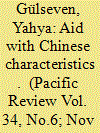

|
|
|
|
|
| Summary/Abstract |
China’s growing foreign aid program in recent years has sparked many debates on alternative development cooperation approaches and practices. ‘Aid with Chinese characteristics’ is often approached with skepticism in the West and considered as posing challenges to the traditional aid architecture. The more optimistic perspectives see China’s emergence as a major donor in a more positive light because it offers an alternative development cooperation model for aid recipient countries, contesting the hegemony of the neoliberal development model. While analysts have mostly focused on whether ‘aid with Chinese characteristics’ is a good or bad alternative, few have questioned its novelty and its actual potential as an alternative development cooperation model. From a neo-Gramscian perspective, this study investigates to what extend China, as a major donor, differs from the traditional donors and in how far that its aid model can be understood as representing a counter-hegemonic alternative. The core argument of this study is that ‘aid with Chinese characteristics’ serves the overall objectives and interests of the neoliberal historical bloc, while at the same time it also plays a role in the increasing tensions and competitions within it, between China and the Western countries in the context of the global financial crisis.
|
|
|
|
|
|
|
|
|
|
|
|
|
|
|
|
| 2 |
ID:
139097
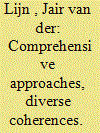

|
|
|
|
|
| Summary/Abstract |
Since 2000, international organisations such as the UN, NATO and the EU, but also countries, have started to apply what has been called the comprehensive approach to crisis management. This article unpacks this comprehensive approach implemented by the Dutch in Uruzgan province, Afghanistan. It first borrows and expands a conceptual framework developed by De Coning and Friis. Subsequently, it maps the different sorts of coherence in the mission by applying the framework. It shows how in practice there was not one single comprehensive approach, but many different forms of interaction between a number of organisational units. Each interaction had its own distinct issues and its own level of coherence. The level of coherence differed depending on the level at which the interaction took place – strategic at headquarters level versus operational at field level – and at what point in the mission it happened – in most cases it moved towards more cohesion.
|
|
|
|
|
|
|
|
|
|
|
|
|
|
|
|
| 3 |
ID:
143264
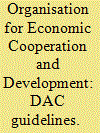

|
|
|
|
|
| Publication |
Paris, OECD, 2001.
|
| Description |
155p.pbk
|
| Series |
International Development
|
| Standard Number |
9264195076
|
|
|
|
|
|
|
|
|
|
|
|
Copies: C:1/I:0,R:0,Q:0
Circulation
| Accession# | Call# | Current Location | Status | Policy | Location |
| 045216 | 338.94/ORG 045216 | Main | On Shelf | General | |
|
|
|
|
| 4 |
ID:
076127
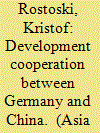

|
|
|
| 5 |
ID:
099842
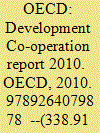

|
|
|
|
|
| Publication |
OECD, 2010.
|
| Description |
277p.
|
| Standard Number |
9789264079878
|
|
|
|
|
|
|
|
|
|
|
|
Copies: C:1/I:0,R:0,Q:0
Circulation
| Accession# | Call# | Current Location | Status | Policy | Location |
| 055394 | 338.91/OEC 055394 | Main | On Shelf | General | |
|
|
|
|
| 6 |
ID:
165284
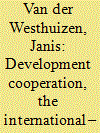

|
|
|
|
|
| Summary/Abstract |
Development cooperation is a foreign policy tool marked by deep-seated conflicts of interest and dilemmas of particular relevance to second-tier and non-nuclear countries that aim to change their international status and role. Building on the concept of ‘graduation dilemma’, this article compares specific dilemmas that Brazil and South Africa face in their foreign policies concerning the development cooperation agenda at three levels: the domestic, the regional and the global level. The research question guiding this analysis is: how does the graduation dilemma manifest in relation to Brazil and South Africa’s role in development cooperation?
|
|
|
|
|
|
|
|
|
|
|
|
|
|
|
|
| 7 |
ID:
136048
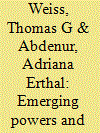

|
|
|
|
|
| Summary/Abstract |
Since the outset, in the aftermath of World War II, the United Nations development system (unds) has constituted an essential pillar of the world organisation’s activities, along with those devoted to peacekeeping, humanitarianism, human rights and justice. Adaptations notwithstanding, serious questions remain about its effectiveness and capacity to represent adequately the aspirations of ‘we, the peoples’ – the opening words of the UN Charter – particularly in the global South. Although developing countries have joined forces at different stages in the international arena – including through the Non-Aligned Movement (nam) and the Group of 77 (G77) – to increase their voices within the system, over the past decade a new twist has been added, the visibility of emerging powers. This reality not only reflects the latter’s growing role as providers of development cooperation but also their criticism of the existing architecture for global economic governance.
|
|
|
|
|
|
|
|
|
|
|
|
|
|
|
|
| 8 |
ID:
136053
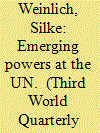

|
|
|
|
|
| Summary/Abstract |
The economic rise of China, India, South Africa, and Brazil has turned these countries into important providers of development assistance. While they seem increasingly comfortable in their bilateral relations with other developing countries, they are struggling to adapt their position within global institutions such as the United Nations. Do they turn their increased weight into a greater influence at the UN, and if not, why not? This article analyses financial contributions and political positioning at the UN in the area of development. Despite small changes, the four countries mostly insist on keeping their traditional status as recipients and ‘ordinary’ developing countries. This reservation can be explained in two ways: first, a more explicit leadership creates political and material costs that outweigh the potential benefits. Second, their shared experiences as developing countries make it hard to break ranks at the UN.
|
|
|
|
|
|
|
|
|
|
|
|
|
|
|
|
| 9 |
ID:
131373
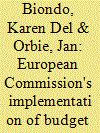

|
|
|
|
|
| Publication |
2014.
|
| Summary/Abstract |
The complex relationship between democracy and development has been extensively discussed in academic literature. However, we do not have much knowledge of how this translates into donor practices. How does the European Commission (EC) deal with tensions arising from promoting democracy and development? To answer this question, this article operationalises the distinction between 'democracy promoters' and 'developmental donors', focusing specifically on budget support and governance incentive tranches. Empirically we examine the implementation of the EC's budget support and Governance Incentive Tranche in Ethiopia (2005-10), a case where the dilemma between democracy promotion and development cooperation is particularly strong. Investigating the position of the EC along the democracy promoter versus developmental donor continuum, we conclude that the EC's position lies between these extremes. However, in the case of budget support, a shift has been made away from the Commission being a democracy promoter and towards the role of developmental donor.
|
|
|
|
|
|
|
|
|
|
|
|
|
|
|
|
| 10 |
ID:
149846
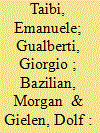

|
|
|
|
|
| Summary/Abstract |
When considering renewable energy, Pacific Island Countries (PICs) focus on energy security and affordability as primary benefits. In Melanesia, access to modern energy services represents a major unfinished agenda. To that end, Pacific Energy Ministers have endorsed the Framework for Action on Energy Security in the Pacific (FAESP) in April 2011. The associated implementation plan (IPESP) was developed, however never formally endorsed. PICs have instead taken a pathway towards national energy transition roadmaps. This paper describes the current status of the energy sector in PICs, the main challenges and the barriers to the deployment of renewable energy and the role of international cooperation in accelerating deployment. In the context of this analysis, technology cooperation is treated as the sum of cooperation on “orgware”, software and hardware. These three dimensions are explored in the context of the Pacific energy sector, looking at how development finance (DF) is currently distributed among them. Looking at the key barriers identified and the areas where DF has been focused to date, this paper proposes a framework for removal of barriers to the deployment of renewable energy in the Pacific through more focused use of DF and technical cooperation. The framework identifies key goals, actors, activities, resources necessary and indicators to monitor progress.
|
|
|
|
|
|
|
|
|
|
|
|
|
|
|
|
| 11 |
ID:
123110
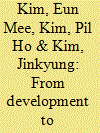

|
|
|
|
|
| Publication |
2013.
|
| Summary/Abstract |
As an emerging donor of Official Development Assistance (ODA), the South Korean government has announced that it will provide a 'South Korean Model of Development Cooperation'. This paper explores how the South Korean development experience from the twentieth century can be transformed into an alternative for development cooperation in the twenty-first century. The early aid management system in South Korea contributed to the bureaucratic capacity-building that was necessary for the installation of the developmental state. In its quest for industrialization, the authoritarian developmental state in South Korea maintained autonomy vis-à-vis foreign donors, foretelling the 'country ownership' principle in today's global norms of ODA. However instructive the South Korean experience may be, it will not work as a 'one size fits all' model for the twenty-first century development due to such fundamental changes in the global political economy as the WTO regime and democracy promotion. In this regard, South Korea's own double transition of economic liberalization and democratization offers another important lesson. Therefore, we suggest a South Korean 'alternative' that respects both the global norms for development cooperation and the national democratic aspirations. It would be a democratic developmental state whose autonomy is more deeply embedded in civil society and whose capacity further expands human capabilities.
|
|
|
|
|
|
|
|
|
|
|
|
|
|
|
|
| 12 |
ID:
120688
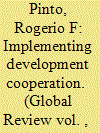

|
|
|
| 13 |
ID:
174562
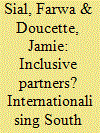

|
|
|
|
|
| Summary/Abstract |
In recent years, non-traditional or ‘emerging’ donors such as South Korea have organised their development cooperation models in a manner that seeks to complement the capacities of the private sector by extending the overseas activities of domestic businesses. To better understand this process, this article examines the role of South Korea’s large, family-led conglomerates (chaebol) in its growing international development sector. In particular, we focus on how the concept of corporate social responsibility (CSR) has been used to link the role of its large, and frequently scandal-ridden, private companies to international development, and, by extension, how it has helped to internationalise state–business networks long associated with the Korean developmental state. We examine two strategies through which this has been carried out. The first is by extending the logic of creating shared value (CSV, a derivative of CSR) to aid and infrastructure projects in which chaebol and other state-linked businesses have participated. The second is by directly embedding CSR-based aid initiatives in the value chains of the specific chaebol themselves.
|
|
|
|
|
|
|
|
|
|
|
|
|
|
|
|
| 14 |
ID:
163364
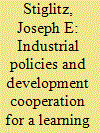

|
|
|
|
|
| Summary/Abstract |
In the countries that have been most successful in development over the past half century, government played a central role (the development state), especially through industrial policies that promoted manufacturing exports. But changes in the global economy mean that African countries won’t be able to rely on the manufacturing export-led growth model. This paper analyzes the reasons for the success of that model, and shows how the same outcomes can be achieved through a multipronged strategy, a comprehensive development plan that pays particular attention to learning and employment.
|
|
|
|
|
|
|
|
|
|
|
|
|
|
|
|
| 15 |
ID:
124215
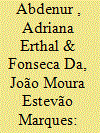

|
|
|
|
|
| Publication |
2013.
|
| Summary/Abstract |
Over the past 10 years Northern aid agencies have made a concerted effort to participate in South-South cooperation. This article analyses the key modes and motivations behind this growing engagement, looking specifically at three areas: multilateral platforms, triangular cooperation and knowledge production about South-South cooperation. Across all these efforts we perceive a concerted attempt to gain legitimacy by emphasising horizontality in the co-construction of knowledge about development. We argue that, within a context of shrinking Northern aid, this engagement is a way to harness South-South cooperation in order to preserve and expand Northern influence, both within and outside the field of development cooperation. This interpretation suggests the need to further examine the 'bridging' initiatives and mutual impact of intersection points between Northern aid and South-South cooperation.
|
|
|
|
|
|
|
|
|
|
|
|
|
|
|
|
| 16 |
ID:
167058
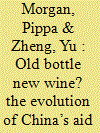

|
|
|
|
|
| Summary/Abstract |
China’s aid is frequently portrayed as a challenger to established Overseas Development Assistance (ODA) norms, but it is unclear when the distinct ‘Chinese-model’ of aid emerged and how it has evolved over time. Using new historical data on Chinese aid in Africa and the case of Ethiopia, we have three main findings. First, China developed a distinct model of mixing ODA-like aid and commercial forms of economic engagement only after the mid-1990s, reflecting institutional reforms for allocating and managing foreign official finance. Second, social sectors have played a much greater role in China’s aid programme than is commonly perceived. Finally, Chinese aid to productive sectors has changed substantially whereas in social sectors it is relatively consistent.
|
|
|
|
|
|
|
|
|
|
|
|
|
|
|
|
| 17 |
ID:
135043
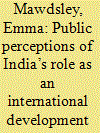

|
|
|
|
|
| Summary/Abstract |
The literature on South–South Development Cooperation (ssdc) has grown exponentially in the past few years. One focus of analysis has been how domestic institutions and agendas shape the approaches to development cooperation of different Southern partners. However, few analysts to date have commented on how the ‘ordinary’ general public of these countries might perceive or assess their country’s role in international development. Through a study based on interviews and media analysis, this paper attempts to tease out the slim evidence currently available on ‘public’ attitudes in India, concentrating, for reasons explained, exclusively on elites and ‘middle classes’. It argues that, while some domestic criticism will certainly accompany the growing visibility of Indian development cooperation, the attractive blend of discursive positioning and material benefits may provide the Indian government with broad support for its growing investment and profile in international development, or at least offset a degree of criticism. At present there appears to be little public discussion about whether and how India’s external role relates to domestic poverty, or the nature of growth and ‘development’ that India is helping to stimulate in partner countries. The paper also discusses ‘boundary making’ with China through the public construction of Indian development cooperation.
|
|
|
|
|
|
|
|
|
|
|
|
|
|
|
|
| 18 |
ID:
125617
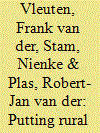

|
|
|
|
|
| Publication |
2013.
|
| Summary/Abstract |
As the Secretary General of the United Nations and the president of the World Bank are calling upon countries to commit themselves to universal access to modern energy services by 2030, and international players such as the International Energy Agency, the EU, and ESMAP are building scenarios how to accomplish this, this article demonstrates the non-linear dynamics of scaling up rural energy access, drawing among others from over 70 energy access projects implemented by the EASE network of national energy and development NGOs in eight countries and on experiences combining microfinance and (clean) energy access. The article shows that scaling up rural energy access demands careful tuning of support to the business models of rural entrepreneurs, in which development finance has only a limited role to play. The article argues for market development approaches that take a programmatic approach, change their intervention model as the market matures, and build on smart use of the limited sector capacity. The ultimate challenge is how to down-tune ambitions and spending power of the development community to match the absorption capacity of rural markets and the reality of entrepreneurs on the ground.
|
|
|
|
|
|
|
|
|
|
|
|
|
|
|
|
| 19 |
ID:
184096
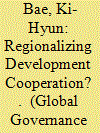

|
|
|
|
|
| Summary/Abstract |
This article investigates Association of Southeast Asian Nations (ASEAN)-level development cooperation, a relatively overlooked dimension in assessing regionalism in Southeast Asia, by examining the Initiative for ASEAN Integration (IAI). The IAI provides a unique case of experimenting with multilateral South-South development cooperation based on regional solidarity; however, despite the declared aspirations and commitments to the program, this article finds that the IAI’s actual development has been quite contrary to the declared goals. First, unlike what was expected, IAI has not been able to provide institutional benefits to help pool ASEAN-6’s resources regionally and coordinate their development programs. Second, the principle of solidarity made the IAI valuable, but it did not stand out in its actions. Third, although its primary goal was to narrow the gap among members, IAI ironically created unwanted diplomatic divide and discontent. The observations confirm a perspective that constructing ASEAN as a regional community is both driven and constrained by member states’ nationalistic priorities.
|
|
|
|
|
|
|
|
|
|
|
|
|
|
|
|
| 20 |
ID:
099000
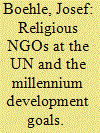

|
|
|
|
|
| Publication |
2010.
|
| Summary/Abstract |
This article reflects on religious non-governmental organisations (RNGOs) at the United Nations and their engagement with the Millennium Development Goals (MDGs) within the UN system. It also situates this engagement within the wider context of contemporary global civil society. It aims to give an introduction to the contemporary situation of religious NGOs at the UN and some of the related and critically debated issues, making use of in-depth interviews with key actors, relevant literature and other documentary materials, as well as selected examples of three major RNGOs engaging with the MDGs. An improved understanding of the work of religious NGOs at the UN and the historical context in which their work takes place can make valuable contributions: it can inform UN agencies and government agencies' policy recommendations and planning decisions, it can enhance self-reflection by civil society organisations, and it can help to identify common ground for all these actors as they seek to develop multi-stakeholder partnerships aiming to meet the MDGs.
|
|
|
|
|
|
|
|
|
|
|
|
|
|
|
|
|
|
|
|
|